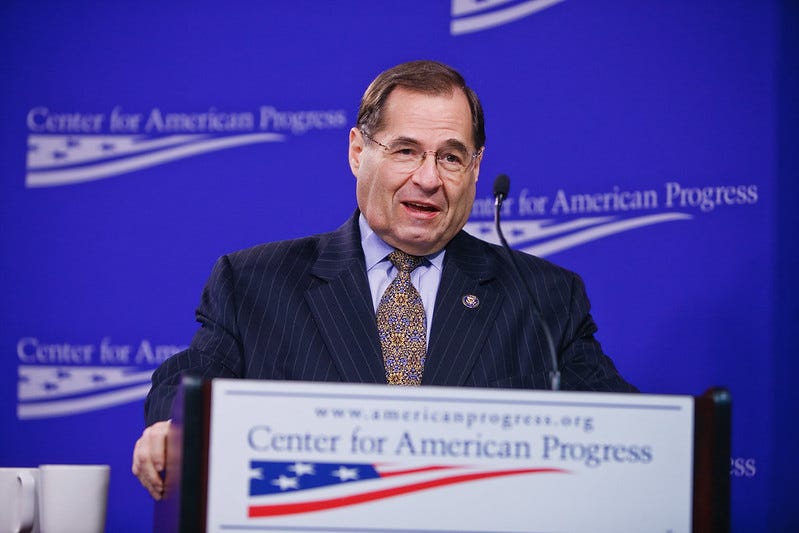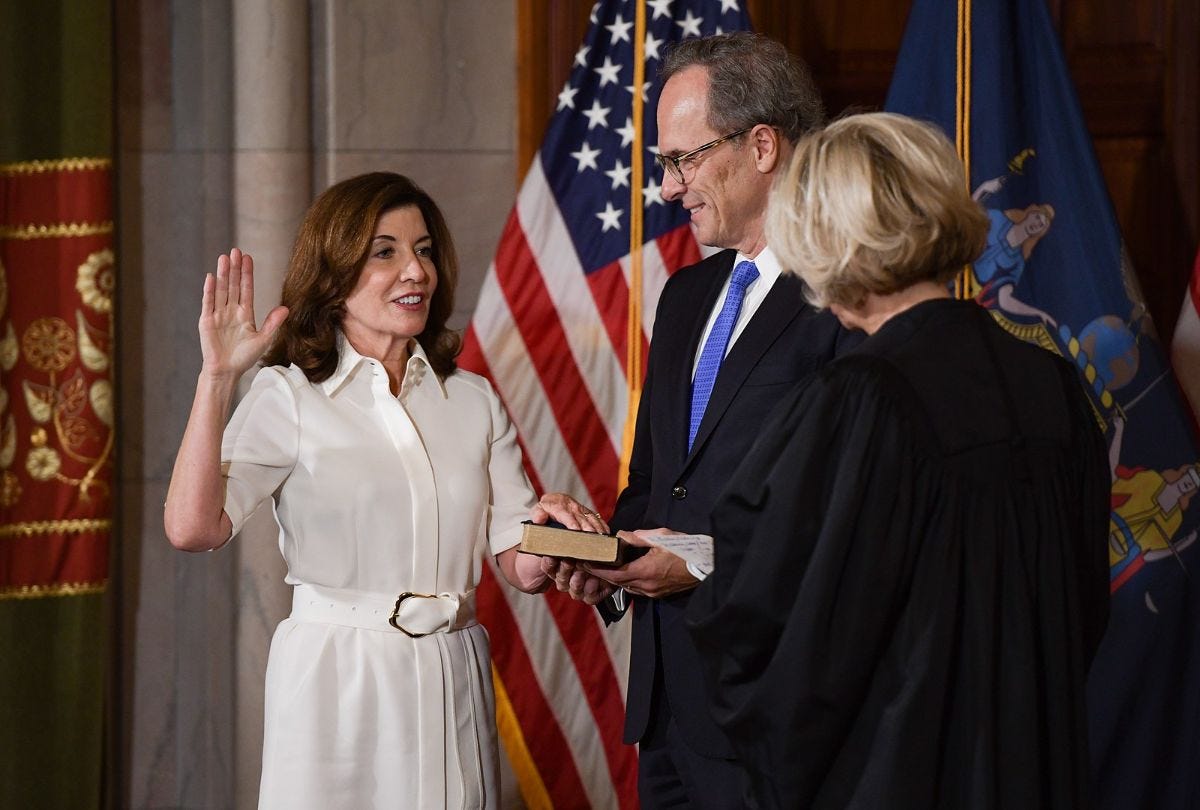Wake Up To Politics - June 2, 2022
Wake Up To Politics: Is anything happening on guns?
by Gabe Fleisher
Good morning! It’s Thursday, June 2, 2022. Election Day 2022 is 159 days away. Election Day 2024 is 887 days away.
Is anything happening on guns?
Funerals for the 21 victims of the Uvalde massacre were just beginning to take place on Tuesday when news of yet another mass shooting rocked America.
In the latest attack, a gunman at a hospital in Tulsa, Oklahoma, killed four people and then himself. Several people were also wounded; none of the victims have been identified, but they were reportedly a “mix of hospital employees and visitors.”
This new mass shooting — the 233rd in the United States this year — lends fresh urgency to the negotiations currently place in Congress and across the country on reforming the nation’s gun laws.
This morning, I want to check in on those discussions and update you on the progress that has — and hasn’t — been made at various levels of government. Here we go:
In the House
House Democrats are planning to vote next week on a number of gun violence-related pieces of legislation.
Most of those bills have been combined into the Protecting Our Kids Act, which will be voted on by the House Judiciary Committee today and then by the full House when lawmakers return next week.
Here are the pieces of legislation that are included in that package:
The Raise the Age Act, which would raise the purchasing age for semi-automatic rifles from 18 to 21
The Prevent Gun Trafficking Act, which would create stand-alone federal criminal offenses for gun trafficking and “straw purchases” of guns (in which someone knowingly gives a gun who will use it to commit a crime)
The Untraceable Firearms Act, which would seek to reduce “ghost guns” (homemade weapons that lack a serial number) by requiring that all firearms (including those that are 3-D printed) be traceable
Ethan’s Law, the Safe Guns, Safe Kids Act, and the Kimberly Vaughan Firearm Safe Storage Act, all of which would create federal requirements for storing guns in homes with minor children (and set criminal penalties to enforce them)
The Closing the Bump Stock Loophole Act, which would prohibit the sale of new “bump stocks” (attachments that allow semi-automatic rifles to fire almost as fast as fully automatic rifles, also known as machine guns) and require existing “bump stocks” to be registered as machine guns
The Keep Americans Safe Act, which would prohibit the sale of high-capacity ammunition magazines (defined as having a capacity of more than 10 rounds of ammunition)

Notably, that list does not include an assault weapons ban, which many activists have called for but would face trouble passing the slim Democratic majority in the House.
Each of the measures that are being voted on by the Judiciary Committee today are expected to receive House passage next week, but they are likely to run into a roadblock in the Senate, where bills require 60 votes to avert a filibuster. So what actions might have a shot at making it through the Senate?
In the Senate
The main nexus of action so far in the Senate has been the formation of a bipartisan group of nine senators — five Democrats and four Republicans — who met over Zoom on both Tuesday and Wednesday.
“There is growing momentum to get something done and we agreed on a plan to keep working,” Sen. Chris Murphy (D-CT), the top Democratic negotiator on guns, tweeted after Wednesday’s meeting.
Per NBC News, the senators agreed to a general framework for a gun control bill, and split into smaller working groups that will hammer out the specifics of each section.
According to the network, here’s what each smaller group is focused on:
Expanding background checks
Creating incentives for states to implement “red flag laws,” which allow authorities to confiscate guns from people deemed by a judge to be a threat to themselves or others
Boosting funding for mental health services and school securityThat’s about as far as the Senate has gotten — although that counts for more progress than there’s been on gun control talks in several years.

What else
There are a few more gun-related updates I want to touch on...
At the Supreme Court: While the nation continues to mourn the victims of several tragic mass shootings, the Supreme Court is likely to roll back gun restrictions in the coming weeks.
Sometime this month, the justices are expected to release their opinion in New York State Rifle & Pistol Association v. Bruen, which challenges a New York law requiring residents to show “proper cause” exists before being given a license to carry a concealed handgun in public.
After oral arguments in November, it seemed the court’s conservative majority was prepared to strike down the law — which could also impact laws limiting “concealed carry” in other states.
In the states: As negotiations continue in Congress, several Democratic-controlled states are moving ahead with new gun control laws.
The highest-profile of those efforts is in New York, where the legislature is expected to pass a bill today that will raise the purchasing age for semi-automatic rifles in the state from 18 to 21.
On the law enforcement side: Investigators continue to examine the recent mass shootings that have attracted nationwide attention.
In Uvalde, the official timeline during the massacre has shifted yet again, with investigators walking back a previous statement that the gunman was able to enter Robb Elementary School because a teacher propped a door open.

Additionally, the various agencies at the center of the probe are sparring with each other: the Texas Department of Public Safety is claiming that the Uvalde school district police force has stopped cooperating with its investigation, which the local agency denies.
Meanwhile, a grand jury indicted the 18-year-old Buffalo shooter — who killed 10 people at a supermarket in a Black neighborhood — on Wednesday, charging him with 25 counts of domestic terrorism, first-degree murder, and other offenses.
In other countries: Finally, at least one other country has cited the Uvalde shooting in tightening its own gun laws. Prime Minister Justin Trudeau moved this week to ban the sale of handguns in Canada, while also proposing legislation that would require residents to hand over their assault weapons as part of a government buyback program.
“We need only look south of the border to know that if we do not take action, firmly and rapidly, it gets worse and worse and more difficult to counter,” Trudeau said, invoking America’s singular epidemic of gun violence.
More news you should know
Baby formula: The White House announced two additional shipments of baby formula as part of “Operation Fly Formula,” its effort to quickly import the scare product from abroad.
The new shipments will include 3.7 million 8-ounce bottle equivalents of Kendamil formula from the United Kingdom and 4.6 million 8-ounce bottles of Bubs formula from Australia.
However, the formula shortage is getting slightly worse: 23% of powdered baby formula was out of stock in U.S. in the week ending on May 22, compared to 21% in the week before. President Biden expressed frustration Wednesday that he wasn’t informed of the shortage until two months in.
Ukraine: It’s the 99th day of the war in Ukraine. As the fighting rages on, Biden announced Wednesday that the U.S. will send $700 million in new military aid to the country, including advanced rocket systems that Kyiv has promised will only be used to defend its territory (not to target Russia).
Meanwhile, the U.S. confirmed for the first time that it has conducted offensive cyberhacking operations in support of Ukraine.
Also worth watching: U.S. officials are reportedly split over how far too push in a new round of sanctions against Moscow, worried that additional punitive measures could spark economic problems around the globe.
Economy: The “great resignation” is continuing: about 4.4 million Americans quit or changed jobs in April, according to a new Labor Department report. There were 11.4 million job openings nationwide that month, indicative of a still-hot labor market.
Student loans: The Education Department announced Wednesday that it will forgive $5.8 billion in federal student loans held by students who attended Corinthian Colleges, a for-profit college chain that went bankrupt in 2015 after years of defrauding students.
That marks the largest amount of student loan debt the U.S. government has ever canceled in a single move. It comes as Biden is weighing a broader student loan forgiveness plan.
Smart story: None of the congressional Republicans who claimed the 2020 election was fraudulent have had similar complaints about their 2022 primary wins, the New York Times points out, even in states where the election laws didn’t change between the two cycles.
Two milestones to know: America’s first lesbian governor could be elected in Oregon this year, per NBC News. And Vermont is likely to send a woman to Congress for the first time, the Associated Press notes, which would mean all 50 states have been represented by a woman in Washington.
Blast from the past: John Hinckley Jr., who attempted to assassinate President Ronald Reagan in 1981, will be unconditionally released from court oversight later this month. “He’s no longer a danger to himself or others,” a federal judge said Wednesday.
What’s going on in Washington today
All times Eastern.
President Biden: Receives his daily intelligence briefing (10:15 am).
Meets with NATO Secretary General Jens Stoltenberg and White House national security adviser Jake Sullivan (11:15 am). They’ll discuss preparations for the NATO summit in Madrid later this month.
Departs for Rehoboth Beach, Delaware, where he’ll spend the weekend (5:30 pm).
Vice President Harris: Joins Biden for his intel briefing (10:15 am).
Takes part in the announcement of the Corinthian Colleges student loan debt cancelation at the Education Department (1:20 pm).
White House briefing: Press secretary Karine Jean-Pierre will be joined by White House Covid-19 response coordinator Ashish Jha (3 pm).
Senate: Out until June 6.
House: Out until June 7. The Judiciary Committee will meet to vote on a package of gun control proposals (10 am).
Supreme Court: Meets for its weekly conference to discuss pending petitions and cases.
Links to watch for yourself: Harris speech on student loan forgiveness • White House press briefing • Judiciary Committee gun control markup
Before I go...
Queen Elizabeth II begins celebrating her Platinum Jubilee — her 70th anniversary on the throne — today.
I thought this New York Times photo essay did a good job putting her tenure in perspective:
“Her reign has spanned virtually the entire post-World War II era, making her a witness to cultural upheavals from the Beatles to Brexit, technological advances from wireless radio to Zoom, political leaders from Winston Churchill to Boris Johnson.”
Above all, the Times wrote, the jubilee celebration is a “a tribute to one of history’s great acts of constancy.”

That’s it for today. If you enjoy Wake Up To Politics, it’s always appreciated if you donate to support the newsletter or buy some merch. Or if you tell your friends and family to sign up at wakeuptopolitics.com.
If you have any questions or feedback, feel free to email me: my inbox is always open.
Thanks for waking up to politics! Have a great day.
— Gabe




